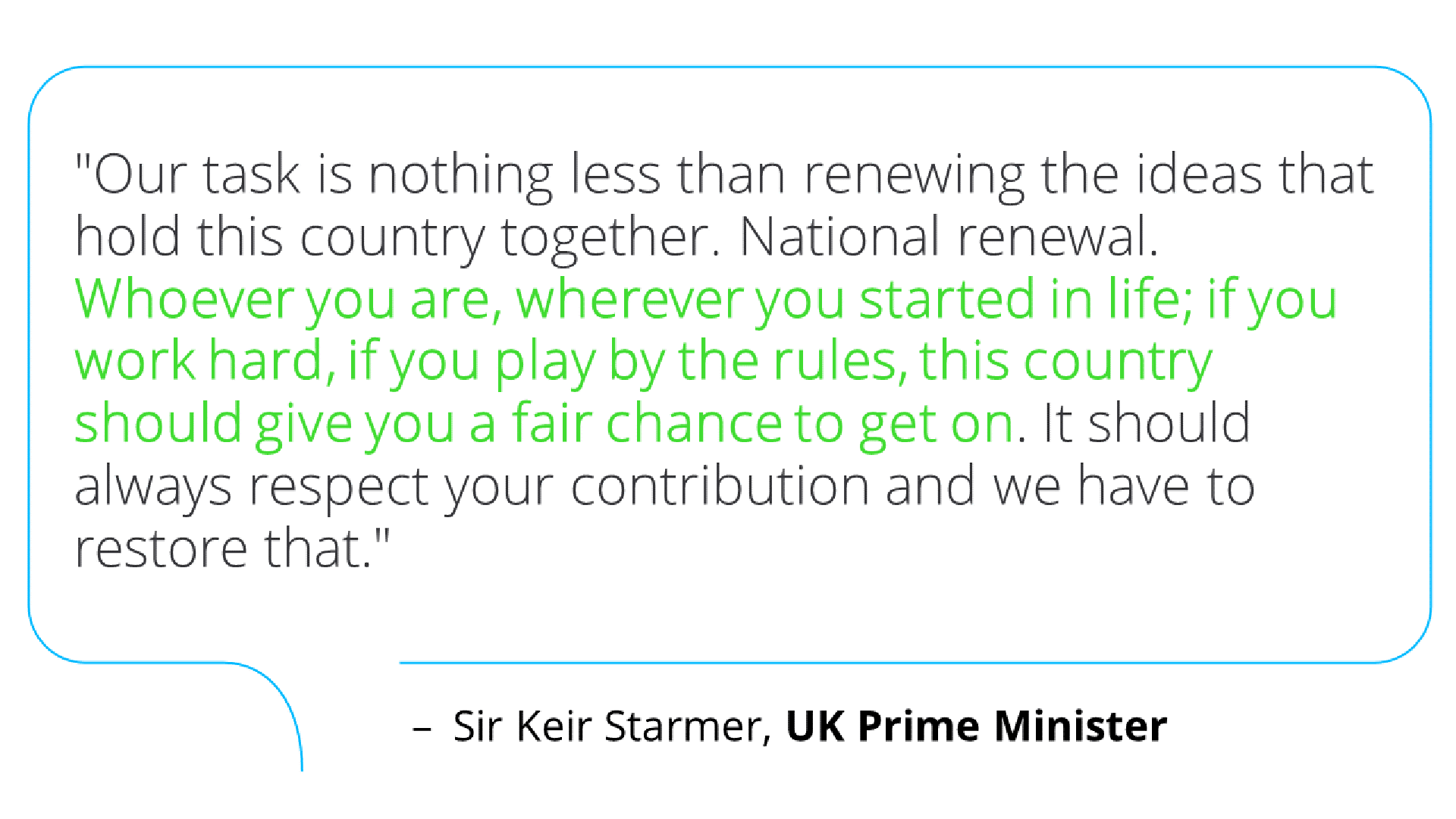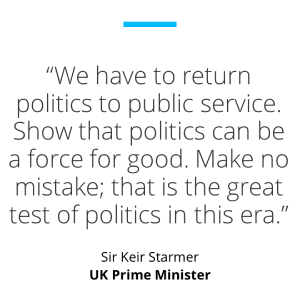Sir Keir Starmer has been elected the UK’s prime minister after a landslide victory for Labour at the General Election — reaching 326 seats at 4.50am on Friday.
For many businesses, the win represents a now stable government that can prioritise economic progress, with hope that what will follow is significant business investment, which the country and economy so urgently requires.
Much focus from Keir Starmer, 61, and his Chancellor Rachel Reeves in recent weeks has been on growth, with the leader arguing that it’s the clear, single route to the UK economy generating the resources it needs to deal with the many challenges we face.
Businesses around the country now await more detailed plans from the prime minister on how the new government will support UK business.
Financial markets have not moved in any major way since opening this morning, edging only slightly higher, as the historic election result was largely anticipated.
In his victory speech, Keir Starmer said: “Our task is nothing less than renewing the ideas that hold this country together. National renewal. Whoever you are, wherever you started in life, if you work hard, if you play by the rules, this country should give you a fair chance to get on. It should always respect your contribution and we have to restore that. The fight for trust is the battle that defines our age.”
WATCH KEIR STARMER’S SPEECH
Businesses can now expect a series of policy changes designed to foster stability, growth, and innovation across various sectors. Here’s what they can expect to see…
Stability and certainty in business taxation
One of the primary commitments of the new Labour government, according to its manifesto, is to provide greater stability and certainty in business taxation. They plan to cap corporation tax at 25% for the entire parliamentary term. This measure aims to offer predictability for businesses, facilitating long-term planning and investment decisions.
The government will introduce a new tax roadmap which includes a permanent full expensing system for capital investments. This allows businesses to deduct the entire cost of capital expenses, encouraging reinvestment and modernisation. Additionally, annual investment allowances will be enhanced, benefiting small businesses particularly, by making capital investments more financially viable.
Explore our upcoming programme, The Future of Investing
Reforming the business rates system
The Labour government is set to overhaul the business rates system to create a more equitable environment between high street businesses and online giants. This long-overdue reform aims to support smaller retail businesses, helping them compete more effectively with large e-commerce platforms. By leveling the playing field, this change is expected to rejuvenate high street shopping areas and support local economies.


Infrastructure development and connectivity
Addressing the UK’s aging infrastructure is a top priority for the new government. A comprehensive ten-year infrastructure strategy will align with industrial and regional development priorities, aiming to modernise the country’s transport, digital, and housing infrastructure.
EXPLORE our upcoming programme, Digital Britain: Connecting the Nation
Key components of this strategy include:
- Full gigabit and 5G coverage by 2030: The government has committed to achieving nationwide gigabit broadband and 5G coverage by 2030, significantly boosting connectivity and supporting digital businesses.
- National infrastructure and service transformation authority: This new body will set strategic priorities and oversee the delivery of major projects, ensuring efficient and effective development of roads, railways, and reservoirs.
- Support for electric vehicles: To facilitate the transition to electric vehicles, the government will increase the number of charging points and reform the railway system by bringing it back into public ownership, aiming to provide reliable and affordable services.
Reversing low investment levels
Another critical commitment is to reverse the UK’s historically low investment levels by leveraging public investment to de-risk and attract private investment. Core to this initiative is the creation of a National Wealth Fund, capitalised with £7.3 billion.
This fund will support growth and clean energy missions, targeting transformative investments across the country. The fund will focus on key areas such as:
- Port upgrades: Modernizing and expanding port facilities to improve trade and logistics.
- New gigafactories: Establishing large-scale battery manufacturing plants to support the electric vehicle industry.
- Steel industry upgrades: Investing in new technologies to make the steel industry more efficient and environmentally friendly.
- Carbon capture technology: Developing advanced systems to capture and store carbon emissions.
- Green hydrogen manufacturing: Promoting the production of hydrogen fuel using renewable energy sources.


Boosting employment and workforce development
Employment reforms are at the forefront of the Labour government’s policies. Key initiatives include:
- Support for disabled and health-affected individuals: Measures will be introduced to help these individuals find and retain employment.
- Youth employment and skills development: The government will focus on creating job opportunities and developing skills for young people, ensuring a robust future workforce.
- Improved working conditions: Legislation will be enacted to ban zero-hours contracts, enhance parental leave, and increase sick pay, improving the overall quality of employment.
Immigration and skills shortages
To address high levels of economic inactivity and reduce reliance on overseas workers, the Labour government plans to reform the points-based immigration system. This reform will focus on addressing skills shortages through local training programs and improving working conditions to attract domestic talent.
References and further reading:

















